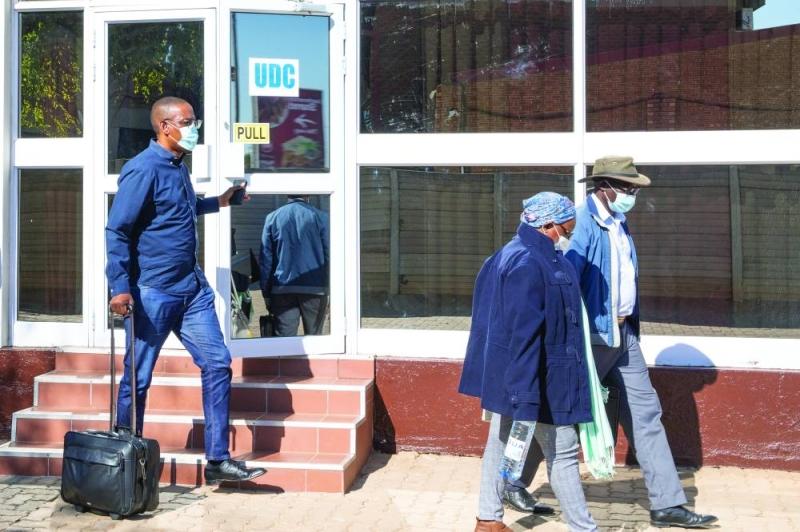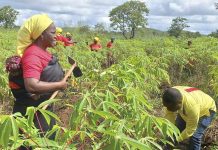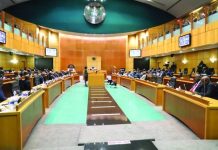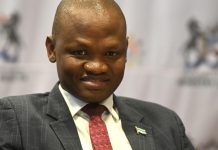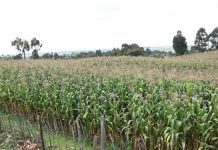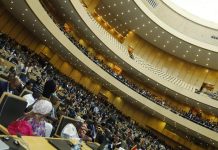Africa-Press – Botswana. Umbrella for Democratic Change (UDC) coalition partners went to Palapye, a place notorious for the infamous 1998 major break up of the Botswana National Front (BNF) and where Botswana Congress Party (BCP) was birthed.
Now, it seems this sad historical event is beset to spoil future dealings between the BNF and its offshoot, the BCP. Will the hoodoo of opposition recur in Palapye as it did in 1998? That is the question in the minds of many as the Palapye meeting could not resolve the stand off between the coalition partners.
The UDC however, can console itself that at least the weekend meet was not violent as the events of 1998 in Palapye which saw comrades throwing all sorts of arsenals at each other including chairs and any missile they could lay their hands on.
Mistrust between the two powerful opposition outfits is as old as the birth of the BCP and it seems set to spoil the good fortunes of the UDC, which has been giving the ruling Botswana Democratic Party (BDP) a run for its money.
The BCP lot quit the BNF then under the founding father Dr. Kenneth Koma whom they blamed for his leadership blunders.
It goes without saying that with the ruling BDP concerned about its dwindling popular vote, a united opposition at the next general election was an existential threat to a weaker BDP.
UDC’s main coalition partners are the longest known nemesis of the BNF and the BCP. The third partner Botswana Peoples Party (BPP) simply plays a cameo role in the tri-party coalition.
Hatred, doubts, accusations and counter accusations are the order of the day whenever the BNF and the BCP have a closer relationship.
The elephant in the room has seemingly been governance issues, which the BCP are clinging on as a reason not to trust its partner the BNF. Currently, the BCP is crying foul that the BNF led by Duma Boko who dabbles also as the UDC president prefers to run the show alone.
Another contentious issue is that Boko doesn’t seem entertaining the notion of holding an elective congress to usher in new UDC leadership, according to the BCP. The BCP is insistent that Boko’s leadership is a threat to UDC inner democracy, as he prefers unilateralism, which they fear might breed dictatorship if not nipped in the bud now.
Just last weekend in Palapye, it looked like another episode in the many that have come to highlight the not-so-stable relationship between the BNF and the BCP.
Boko is accused to have not called UDC leadership meetings to enable the party leadership to discuss pertinent issues since 2019 general election.
The UDC went to Palapye bedevilled by trust issues and emerged from the meeting without resolving even a bit of their differences. Instead, the meeting reflected more on polarisation of the coalition partners especially the usual nemesis, the BCP and the BNF.
Quizzed about the role of the BNF in the UDC unity, BNF spokesperson, Justin Hunyepa is insistent that since its formation, the BNF wanted a united opposition that would deliver Batswana from the BDP poor governance.
“The BDP has been pro-capitalist since its formation and therefore, has not served the interests of Batswana at all. The BDP formation was sponsored by the British colonial masters who wanted Batswana to be stooges so that they can continue exploiting national resources like land, wildlife, livestock, minerals and so on,” explained Hunyepa.
Dr Koma and other progressive Batswana formed the BNF in 1965. The main objective according to the BNF spokesperson was to unite these splinter formations and have a solid united front that will also recruit trade unions, farmers, academia, student organisations, petty bourgeoisies and other progressive civil society organisations.
He insists that the BNF still embrace the formations, which have different backgrounds, hence its mass movement character and appeal, all under a social democratic programme.
To fully embrace democracy, the BNF consciously provided platforms for straight talk- Puo Phaa through criticism and self-criticism and these robust debates have at times been mistaken for internal wars and a divided party.
It should also be noted that the BCP unceremoniously left the UDC on the eve of the 2014 general election, the BNF and other alliance partners remained committed to the opposition unity initiatives.
Towards 2019 general election, the Botswana Movement for Democracy (BMD) had its own political differences leading to the formation of Alliance for Progressives (AP) outside the UDC.
In the 2019 general election, the BNF, which has been fixed in opposition unity politics, now enjoyed the BCP come back, which had no choice after the 2014 general election humiliation.
“The united opposition under UDC and BNF president Boko again produced impressive results though it was tipped to win the general election. But the BDP could not have it again through their massive rigging mechanisms. It is however, refreshing that today, the nation now believe in the UDC coalition which the BNF has been committed to and never left it,” said Hunyepa.
Hunyepa’s explanations came before an exposed ploy by some UDC leaders to push for the firing of the BCP from the UDC. The BCP’s offence is allegedly that it has brought the good name of the UDC into disrepute. Although there is no official position from the BCP, it seems that is waiting anxiously to be fired from the coalition.
The UDC spokesperson, Moeti Mohwasa held a post Palapye leadership meeting press briefing in which he indicated that it was resolved that the BCP was offered to apologise for its utterances failing which it would be suspended from the UDC.
This prompted a response from Dr Mpho Pheko, BCP spokesperson who issued a statement immediately expressing the views of her party.
“In our view, the briefing was not a true reflection of the discussions that took place at the UDC NEC meeting as it completely disregarded the submissions made by the BCP,” Pheko wrote insisting that if those charged with the responsibility of communicating on behalf of the UDC choose to not give a true account of the NEC discussions, the BCP will be obliged to set the record straight.
Post the Palapye meet; the BCP has dispatched its senior leadership to traverse the length and breath of the country consulting the masses about the developments of the meeting.
Dr Pheko further explained when consulted that: “ We will be updating members on developments within the UDC, their party (BCP)-sharing what we already communicated in our latest press release. And most importantly, we will also be seeking their counsel.”
Meanwhile, in a previous interview, political analyst Professor Zibani Maundeni held the view that Botswana has not generated sufficient conditions for the establishment of election winning coalitions. In his research paper entitled “Political Instability, Electoral Violence and Coalition Governments in Africa: The Basis for Successful Liberal Politics and the Failure of Coalitions in Botswana”, Maundeni said attempts by opposition parties to institutionalise their own cooperation through coalitions for winning elections have been problematic with visible and costly failures.
The paper focused on a case study on democratic Botswana. “Therefore, localised and without clear historical precedence in Africa, Botswana parties’ attempted coalitions for winning elections are having a hard time to take root and function. Coalitions between Botswana opposition political parties have also been attempted but either collapsed or failed to win elections,” said Maundeni.
For More News And Analysis About Botswana Follow Africa-Press

